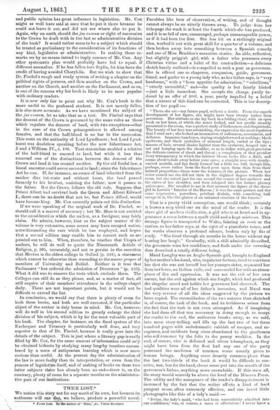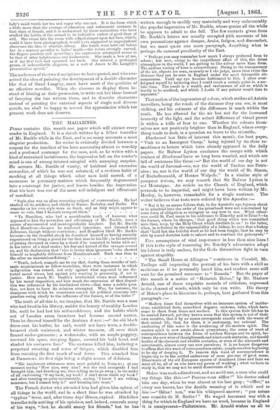TWICE LOST.*
WE notice this story not for any merit of its own, but because its authoress will one day, we believe, produce a powerful novel.
• Twice Lost. By the author of" Nina,"fte. Virtue Brothers.
Faculties like hers of observation, of writing, and of thought cannot always be so utterly thrown away. To judge from her title-page the work is at least the fourth which she has produced, and it is as full of raw, unmanaged, perhaps unmanageable power, as if it had been the first. She has hit on a strikingly original idea, worked it out with great skill for a quarter of a volume, and then broken away into something between a Spanish comedy and one of Miss Braddon's sensation stories. An able, reflective, but slightly priggish girl, with a father who possesses every Christian virtue and a habit of fiat contradiction—a delicious sketch barely outlined—is compelled to seek a post as governess.
She is offered one as chaperon, companion, guide, governess, friend, and gaoler to a young lady who, as her father says, is "very handsome," with a "keen appetite for admiration," "rebellious," " utterly untruthful," and—the quality is but faintly hinted —just a little immodest. She accepts the charge, partly in- duced by an offer of 2001. a year, partly impelled by a belief that a nature of this kind can be corrected. This is her descrip- tion of her pupil :—
" There she sat—my future pupil, without a doubt. From the superb development of her figure, she might have boon twenty rather than seventeen. Her attitude as she lay back in a folding chair, with an open book on her knee, at which she never looked, and her profile steadily presented to the room, was a perfect study of listlessness and disquietude. The beauty of her face was astonishing, the expression the most repulsive that I over saw ; she looked an incarnation of sullenness, resentment, and defiance. Immense hazel eyes, staring straightforward at nothing, black eyebrows, and black eyelashes of unusual length, curled at the tips ; masses of hair, several shades lighter than the eyebrows, heaped into a net and hanging upon the shoulder, so as to define with great precision the delicate contour of cheek and throat; a complexion of that peculiar ivory transparency in which the faintest bloom looks like a flush, and seems about to fade away before your eyes ; a straight nose with deeply- curved nostrils, and lips finely formed but a little too full, though this, perhaps, arose rather from the fixed pout upon them than from their natural proportion—these were the features of the picture. When her sister named me she did not turn in the slightest degree towards the room, but she raised just for one second the corner of her eyebrow and the curve of her shoulder' and then relapsed into her former gloomy quiescence. She recalled to me in that moment the figure of the slave. girl in Lewis's Interior of the Harem ;' it was the same gesture and the same expression ; powerless, petulant disdain, with something half savage in it, like the glance of an untamed creature of the forests."
That is a pretty vivid conception, one would think ; certainly it leaves a very vivid one on the mind of the reader. It is the slave girl of modern civilization, a girl who is at heart and in ap- pearance a cross between a spoilt child and a kept mistress. This strange figure is transported to Wales, fainting en route at the station, as her father says, at the sight of a pianoforte tuner, and for weeks observes a profound silence, broken only by fits of study. "She lived through six months in the house without my hearing her laugh." Gradually, with a skill admirably described, the governess wins her confidence, and finds under the covering thus described a totally different being.
Maud Langley was an Anglo-Spanish girl, brought to England
by her mother's husband, who, to gain her fortune, tried to convince her that shin was not herself but her younger sister, separated her from her lover, an Italian exile, and surrounded her with an atmos- phere of lies and oppression. It was not the evil of her own nature, but the evil against which she fought, which had produced the singular mood and habits her governess lied observed. The bad qualities were all of her father's invention, and Maud was the very reverse of all the ideas suggested by the picture we have copied. The reconciliation of the two natures thus sketched is, of course, the task of the book, and its feebleness arises from the fact that the task is not even attempted. As if imagining she had done all that was necessary in doing enough to tempt the reader to the end, the authoress breaks away, as we said,
into mere story-telling, and fills up the last two of her three hundred pages with melodramatic rubbish of escapes, and re- captures, and incidents long since abandoned to the gentlemen who sell romance by the folio to the penny weeklies. In the end, of course, vice is defeated and virtue triumphant, as they might have been from the first had any one of the party possessed the modicum of common sense usually given to human beings. Anything more drearily commou.place than the last two-thirds of the book it would be difficult to con- ceive, nor, but for the hard, clever sense put into the mouth of the governess's father, anything more unreadable. If this were all, the story would scarcely be above the level of the Al inerva Press. The oddity and the annoyance of the reader's disappointment is increased by the fact that the writer affects a kind of hard pungent sense, often extremely effective, and can insert little photographs like this of a lady's maid :—
" Irvine, the lady's maid, who had been unavoidably admitted into our confidence,' was, of course, a mass of affectation: I never knew a lady's maid worth her tea and sugar who was not. It is the form which a little more than the average of education and refinement assumes in that class of female, and it is understood by those naturalists who have studied the habits of the animal to be indicative rather of good than of evil. She swam into the room with a fixed simper upon her face, which, could it have been photographed, would have suggested to unprejudiced observers the idea of absolute idiocy. Her hands were held out before her in a manner peculiar to ladies' maids—the wrists strongly curved, the fingers pendent and sprawling ; the expression attempted seems to be that of utter helplessness and uselessness. She made a bow at me, as if my first look had sprained her back. She uttered a prolonged groan, of indescribable elegance, as a sort of Amen to Mr. La.ngley's presentation speech."
The authoress of the two descriptions we have quoted, and who con- ceived the idea of painting the development of a double character like that of Maud Langley, must have most of the qualities of an effective novelist. When she chooses to display them in- stead of hinting at their possession, to write out her ideas instead of fancying she has written them, and to describe characters instead of painting the external aspects of single and diverse moods, we shall be happy to accord the appreciation which her present work does not deserve.































 Previous page
Previous page